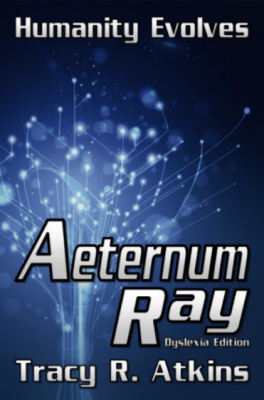
By the time of William Babington’s heart attack, technology has made it possible for humans to “transcend” at the moment of death, converting their genetic information into digital form, thus become something like previously organic AIs. Designed and maintained by the near-omnipotent and omni-benevolent artificial intelligence known as Ray, Aeternum is a kind of digital afterlife where those who choose to transcend can continue their lives eternally.
Atkins does not limit his story to Aeternum, however. Babington chronicles developments, both technological and social, on Earth as well as in Aeternum. Atkins has a powerful imagination and is willing to think through all sorts of potential consequences to the changes that come as a result of human shortsightedness and the technological advances that save humanity from itself. When Atkins describes life and events on Earth and in Aeternum he considers all the possible ramifications and makes narrative choices that are utterly believable. For science fiction, Aeternum Ray requires surprisingly little suspension of disbelief.
Like most science fiction, Aeternum Ray is nothing if not a book of ideas. Carl Sagan wrote, “In a novel of ideas, the ideas have to work.” Atkins’s ideas most definitely work. (There are, however, a few things Sagan might quibble with. For a book set so far in the future and otherwise showing so much social and political insight, it is oddly sexist. Babington refers to his wife as “the wife” and “gives her the honor” of closing down their shared house when they pick up virtual sticks to move their entire holdings to another planet.)
Technophiles will be absorbed by the depth of technological detail, while readers who long for a character they can relate to — and a bit of drama as well — will not be left wanting. The novel maintains a nice balance between a tour of technological wonders and a very human story of a man you can’t help but love.
Unlike so much recent science- and speculative-fiction, Aeternum Ray is in all ways a Utopia. This is the world we hope our species can somehow manage to pull off. Like its narrator (and its god-like AI, Ray), the book is gentle and kind and hopeful. An evening with Babington and Ray and the other characters of Aeternum Ray is a perfect antidote to a day spent in our fractious world.
Links
Get an Editorial Review | Get Amazon Sales & Reviews | Get Edited | Get Beta Readers | Enter the SPR Book Awards | Other Marketing Services






















Leave A Comment